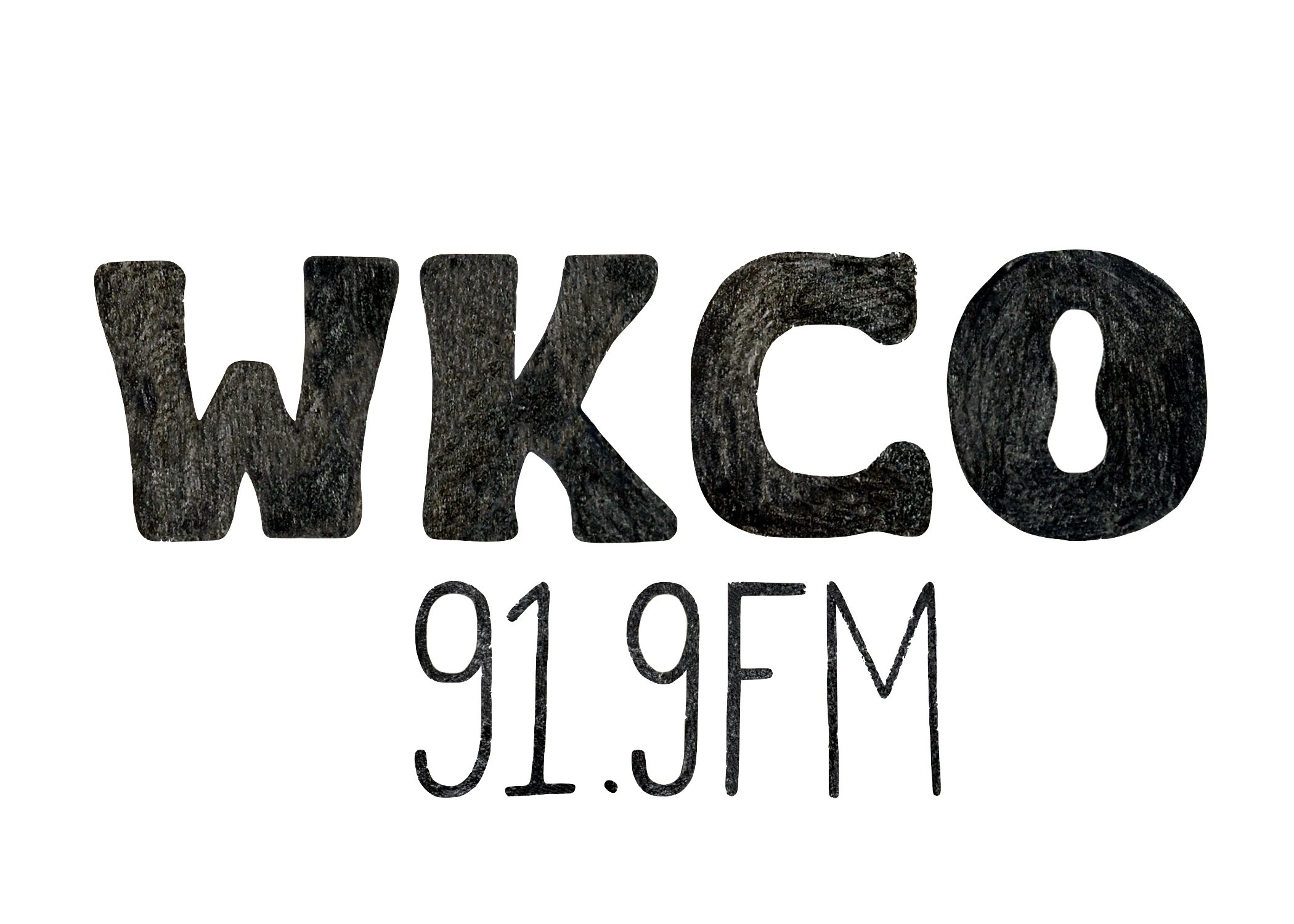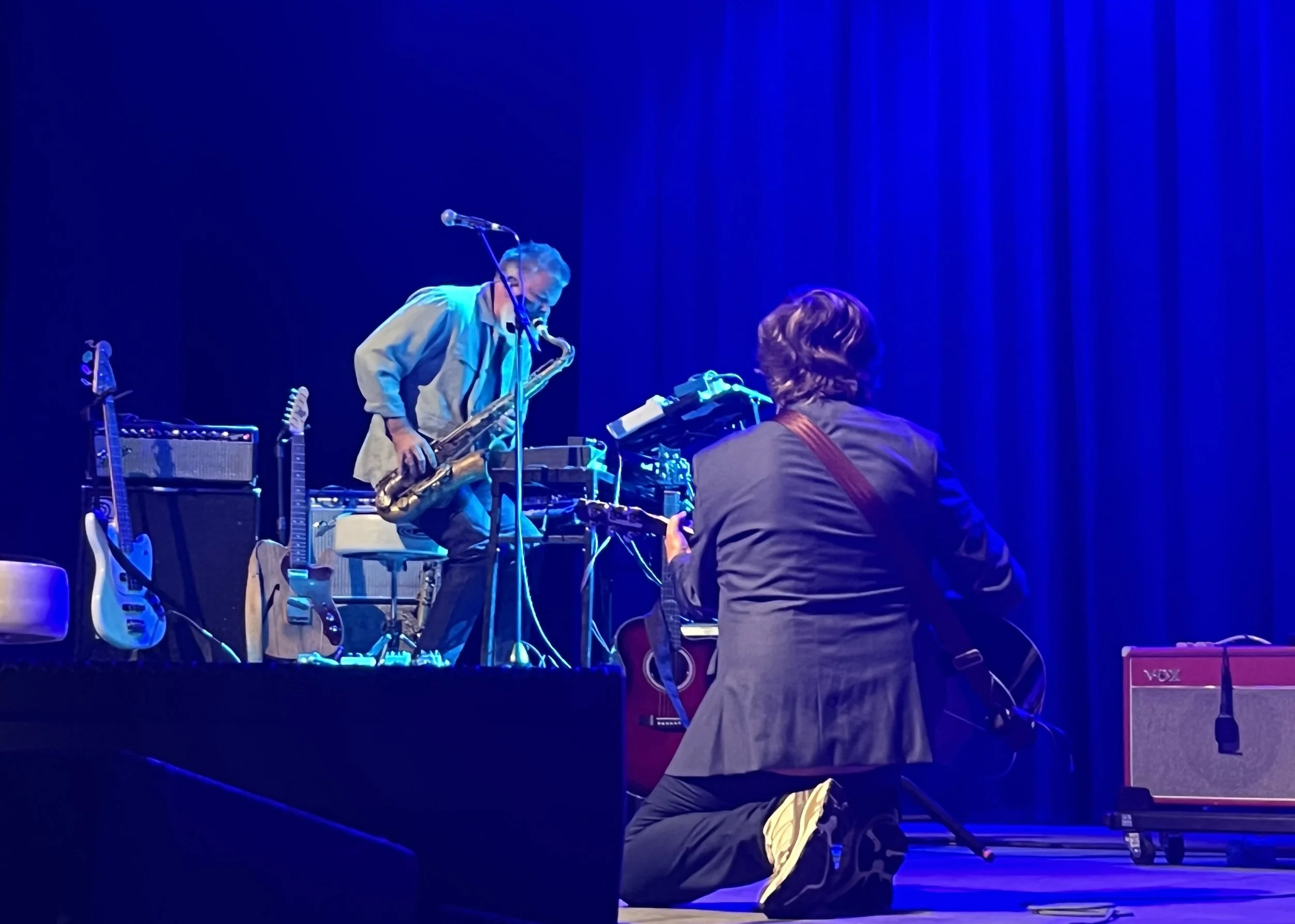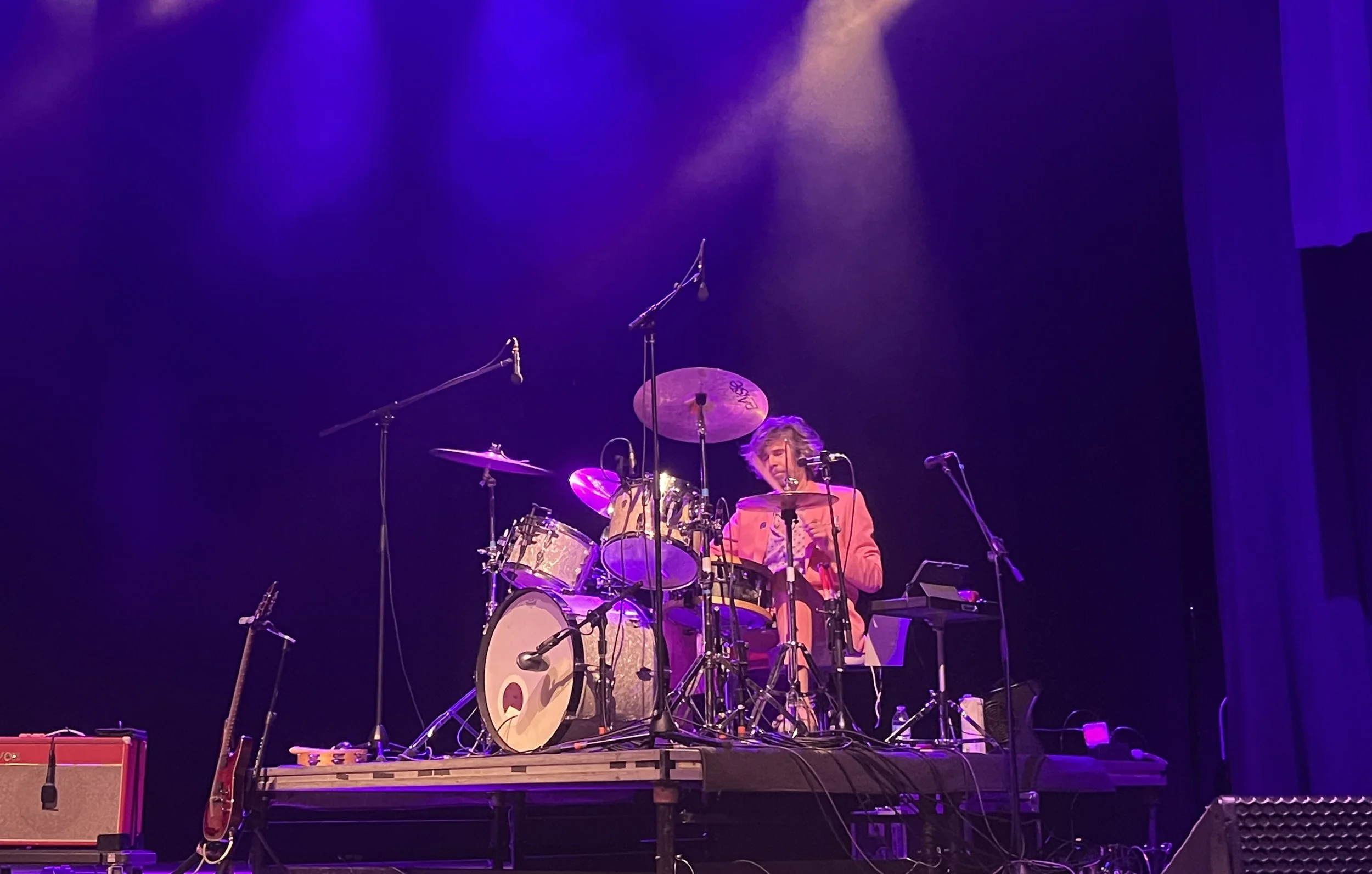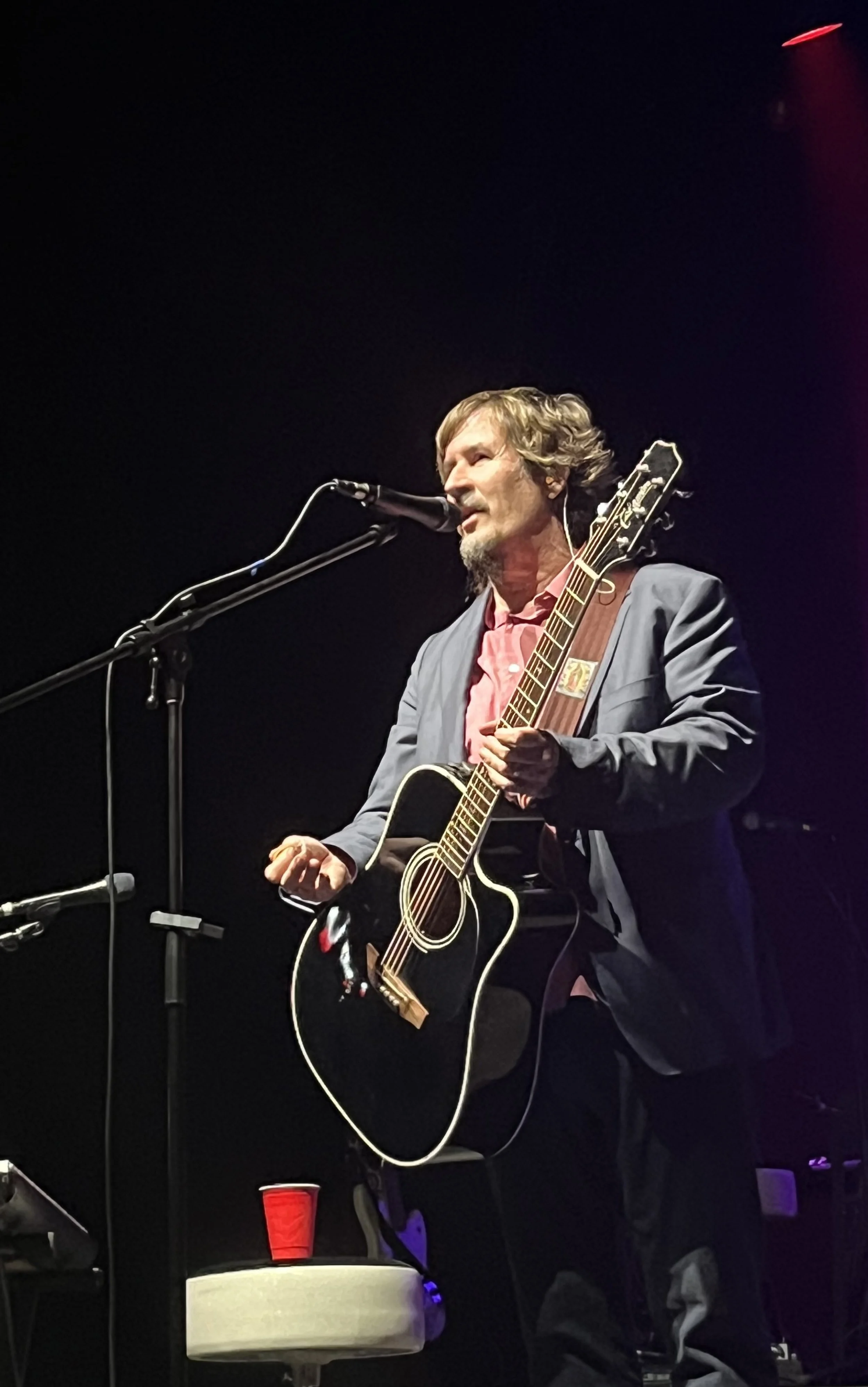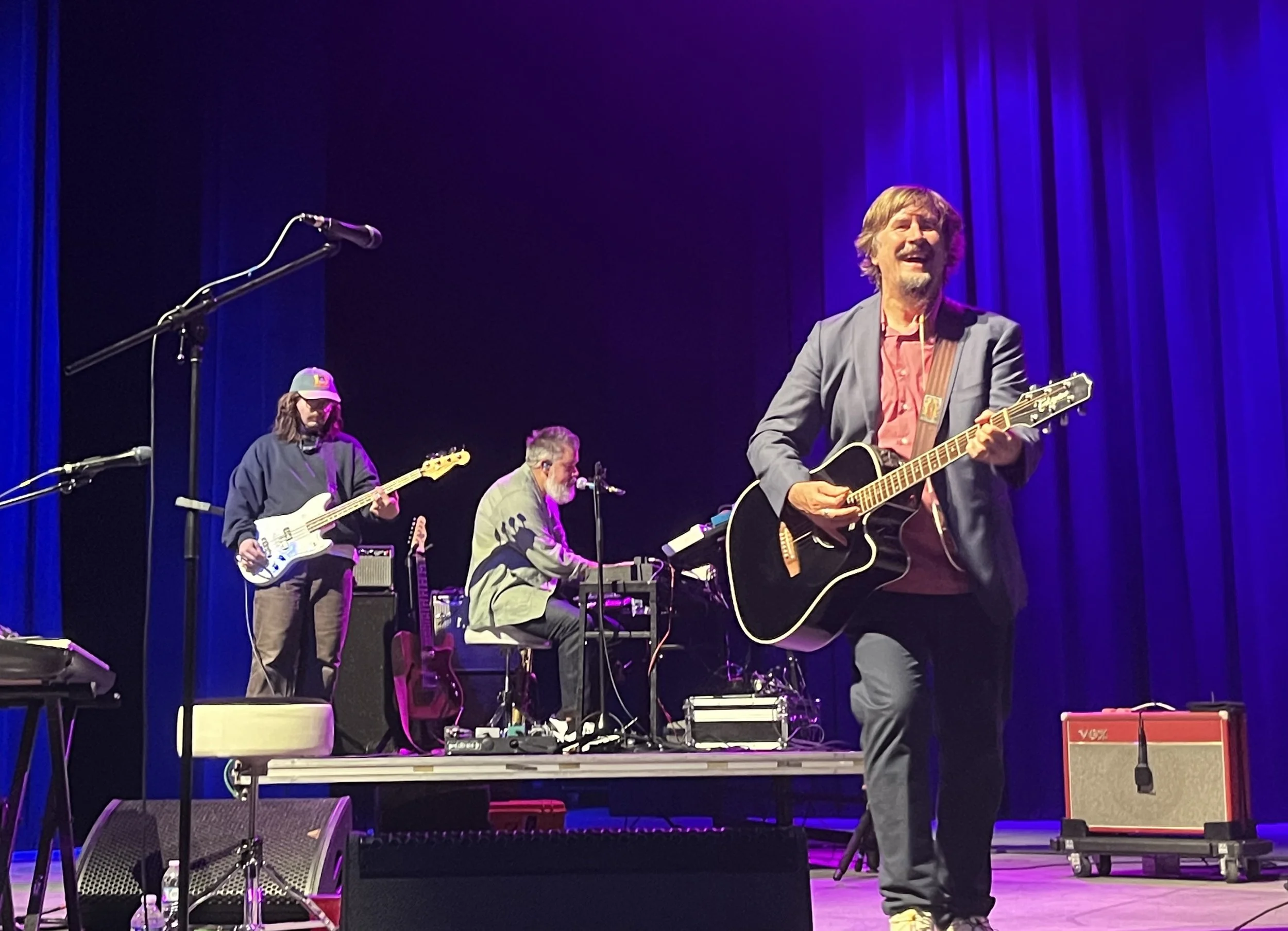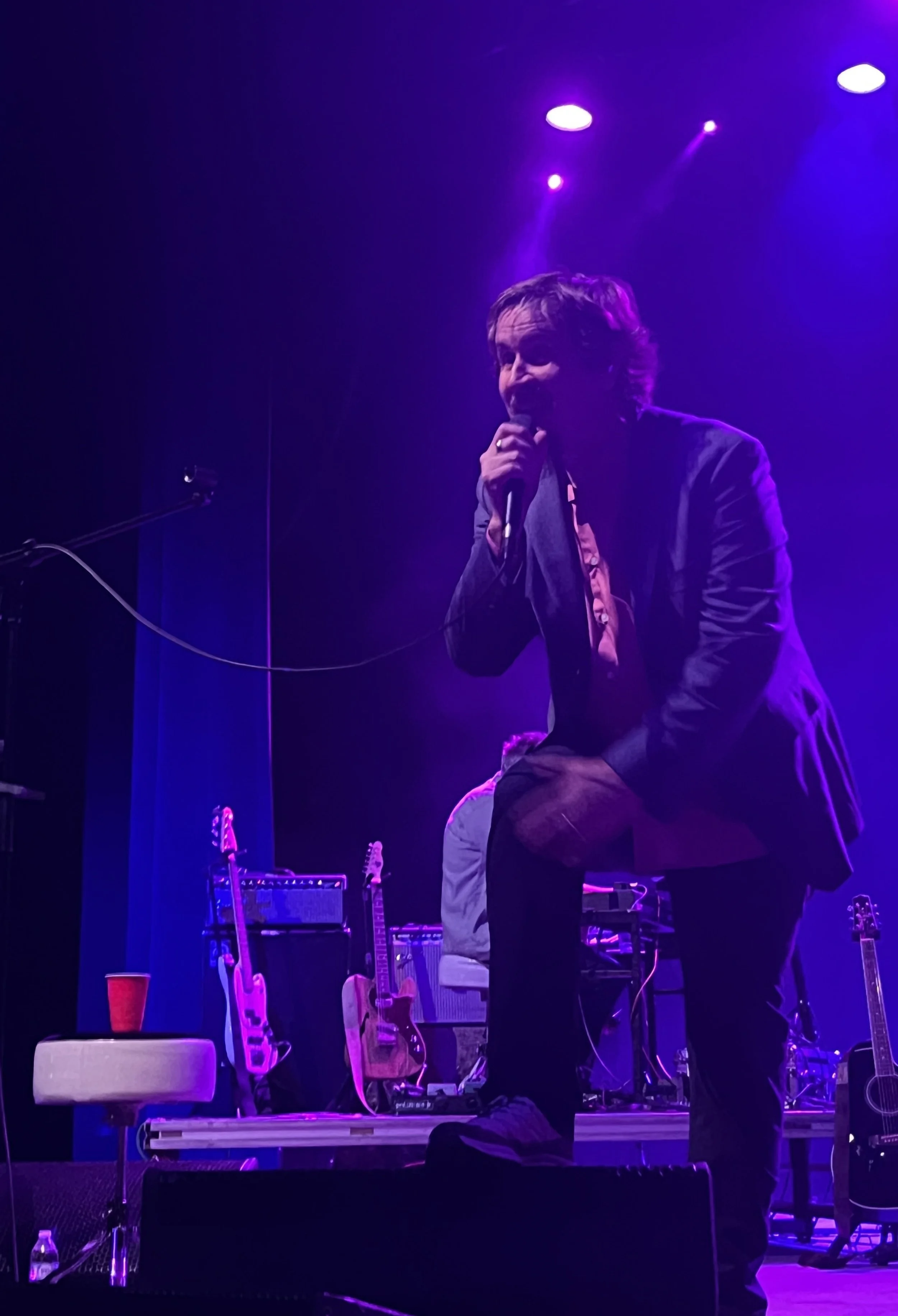Sending Out Signals: The Mountain Goats in Cleveland
article by Milo Goldmark and Quinn Washburn.
Milo Goldmark is a musician with experience performing live and some knowledge of the Mountain Goats. While Quinn Washburn can’t play any music, he’s a Mountain Goats super-fan. This edited conversation began as soon as the Mountain Goats’ show at the Agora Theatre was over.
Quinn: We’re… we’re rolling.
Milo: Alright, this is Milo Goldmark with Quinn Washburn, on September 26th in Cleveland, Ohio.
Quinn: Who’d we just see?
Milo: The Mountain Goats, at the Agora, where we were given free tickets in exchange for writing this review for WKCO. Really good show dude.
Quinn: They’re so much fun to watch.
Milo: Super silly and fun energy. Such a dad band. The audience was tons of dads and the band is all dads.
Quinn: The audience at a Mountain Goats show is such fun, it’s such a strange mix. Right, I mean, everybody needs to “make it through this year if it kills” them. Half of it’s dads, and the other half is like alt twenty-somethings who the Goats got through high school.
Milo: Are you one of those?
Quinn: Well, I’m not alt and I’m not twenty-something, but they sure got me through high school. I’m not sure I know—how did you get into them?
Milo: I think a friend played “This Year” for me in like fifth grade.
Quinn: Wow, before me.
Milo: That’s kind of shocking. But they’ve been different for me than you. Like they’ve been a background band. I’ve spent some time with The Sunset Tree and I’ve heard Tallahassee like two or three times. I know some other hits here and there, but I’m far from a super fan.
Quinn: Such classics. I remember the first time I heard The Sunset Tree. It was the winter before COVID, I guess, and I was walking to the school bus and there was ice on the trees. It made me incredibly happy.
Milo: They’re a band that can really make you feel something. I’d say “happy” isn’t the first emotion I think of when I think Mountain Goats. Though the rest of our group was pretty new to them, and they seem to have had a great time. Wait so let’s stay on topic. Let’s talk about the band.
Quinn: I totally agree with you, I’m glad our friends had fun. But yeah, so there’s John Darnielle, who’s the frontman-writer-singer. He’s this great, bizarre guy who used to be a punk but he’s wearing a blazer and khakis and sneakers now.
Milo: I was really into the drummer, Jon Wurster I think you said?
Quinn: Yeah Jon Wurster and Matt Douglas are the other two.
Milo: Yeah so Darnielle is great, but he’s not doing anything crazy on his guitar, so the other two guys have to fill it out. Wurster is a rock-solid drummer, and he’s super fun to watch. And then Douglas, on keys, sax, and bass.
Quinn: There’s nothing he isn’t doing. He’s started producing for them. I love him.
Milo: His sax is so much fun to watch.
Quinn: He definitely does a lot with it. He likes to get jazzy with it, but then even on a more rock song like “Bones Don’t Rust,” he’s just pouring himself into that thing.
Milo: And his playing across all his instruments is really impressive, he’s so talented.
John Darnielle kneeling to Matt Douglass’s saxophone during “Bones Don’t Rust”
Quinn: It’s amazing to see how the instrumentation fills out the hole that their bassist, Peter Hughes, left when he retired last year.
Milo: It’s interesting that they didn’t, like, go out and hire a new bassist. I think there’s a lot of reasons for that. One is the way they do their sets. They’re playing different songs every night off of like 30 albums. They couldn’t find someone who could play 30 albums like it’s nothing. They had to choose between a new bassist and a predictable setlist or a three man band and more interesting sets. They chose more interesting,
Quinn: For sure. And the band knows each other too well to try and bring someone totally new in. I mean, they did bring someone out for one song where they couldn’t do without four parts, and it was their guitar tech! We’ll talk about him more later, but do you remember what Darnielle said?
Milo: “This is Ben Loughran, he’s part of the family.”
Quinn: Exactly.
Milo: Aside from “This Year,” when they bring on Loughran, it’s really artistically interesting that they’re able to make their music work with three people. For one, lots of these songs were written with at the very least four musicians in mind. Even though Douglass has started playing bass, they still have to decide: oh, do we sacrifice keys on this song? Or bass? Do we sacrifice guitar and put Darnielle on piano? It’s a big question: how do you make these songs work with one less piece? As somebody who’s tried to play in a band with only three instrumentalists before, it is very tough to make work. It’s doable, but it’s much more challenging without that fourth piece, so it’s really impressive that they manage it and still sound so good.
Quinn: It’s a big adjustment for the band, but one I think they’ve figured out. What did you think about the songs, or the structure of the set?
Milo: Good question. They came out with some energy. The first few were songs I didn’t know, but they got everyone going.
Quinn: I thought the second song, “Corsican Mastiff Stride,” was especially good—Wurster is having crazy fun on the drums for that song, you can really tell. And I remember you leaned over to me and asked for the song name during “First Blood.”
Jon Wurster on drums playing “Corsican Mastiff Stride”
Milo: I really liked that one. This section, those first four or so songs, got everyone excited and showed us the direction of the show, like when they slowed it down and brought the sax we were talking about earlier in on “Bones Don’t Rust.”
Quinn: I think “New Zion” had the sax too, which isn’t a crazy deep cut, but I really liked.
Milo: Well, do you remember what was after “New Zion?”
Quinn: The crowd was shocked, man—I’ve seen the Goats more than once and I’ve never heard them play an All Hail West Texas song.
Milo: Everyone went crazy, as they should, since they played “The Best Ever Death Metal Band in Denton.”
Quinn: Everybody’s screaming every word of that song, because they were screaming every word of it in high school, or on the worst days of their lives. It’s the Mountain Goats at their best because it’s John Darnielle singing about how life is worth living—how you can’t defeat creativity. Or spirit. And they never play it!
Milo: It’s nothing like the album version either, it’s way bigger, crazier. On the album, it’s much more laid back in a way, with just Darnielle on the guitar. But here I mean—really active and in your face drums, and Douglass was also super into it. It was the most exciting song of the night so far, and they busted it out like it’s some random deep cut!
Quinn: But it’s one of their best! And then—and then they played the deep cuts!
Milo: Yeah, I mean… everyone has just scream-sang “Best Ever Death Metal Band” and we’re all catching our breath and what do they do?
Quinn: Wurster and Douglass leave the stage. They leave Darnielle alone up there—kinda like on All Hail West Texas, where “Best Ever Death Metal Band” is from. This is another thing about the Mountain Goats: as much as they are this trio, they’re also just kind of wherever John Darnielle is. For years, it was just him. So there are all these old, old songs that are just written for guitar. The lyrics are in a very different style from the lyrics we get now with a full Mountain Goats band… they’re much odder, sort of surreal and unconcerned with people hearing the songs. Do you know what I mean?
Milo: When Darnielle was talking about his new book, he was saying back in those days he never thought anyone would listen.
Quinn: It speaks to his power as a musician—or a poet, whatever—that in 2025 in the middle of a rock show he breaks it out and the whole room goes dead silent while they listen.
Milo: “Hatha Hill” was one of the most interesting parts of the whole show looking back. It’s a song he wrote almost 25 years ago, but as far as I can tell online, there’s no other set where they’ve performed this song, and it’s so special that we got to be the first audience for it.
Quinn: It’s so small and intense. And that thing he did with his finger! He would pause and he would bang on the guitar, like it’s a drum.
Milo: I love when an artist goes back and remembers the music they wrote 20 years ago. It’s so interesting to watch them look back at their career and give some love to the songs that come from a completely different time in their life.
John Darnielle telling a story alone on stage.
Quinn: Darnielle might not be for everybody—I don’t think other people like John Darnielle exist on the planet—but if you like it, Darnielle’s solo section in every show is special. There’s an expectation that even if you’re a super fan, he’s going to play something you don’t know. And then the rock band’s gonna come right back out and tear it up.
Milo: They tear it up, yeah, but they get back to the groove with songs like “Luna” or “Great Pirates.” Sometimes it’s odd to not know all these songs, I might have enjoyed them more if I knew the band better. Still good, don’t get me wrong, but an odd set for someone with my level of familiarity with the band.
Quinn: I get what you mean. A song like “Werewolf Gimmick” is fun in certain ways and not fun in others if you can’t sing along.
Milo: One song I did know all the words to was “The Young Thousands.” In the past month or so, I knew we’d be going to this concert, so I’m like, okay, I need to familiarize myself with more of their music. I knew I couldn’t possibly hear all of it, but I ended up getting into We Shall All Be Healed. And “The Young Thousands” is just absolutely incredible.
Quinn: It’s a beautiful album. It’s about the worst times in Darnielle’s life. It’s about drug use and friends dying.
Milo: It does what the Mountain Goats do best. Everything about Darnielle’s voice and tone, the lyrics, the production, the guitar: it sounds so good. It’s done so well. And on stage it just hit so much harder.
Quinn: I think I almost cried. It was horrifying. In a brilliant way—I think it’s incredible. The song has death hanging over it the whole time. It’s a song about people who don’t have any reason to believe they’ll survive the month—or the day. And it’s so intense on stage, with the band ramping up the volume, and Darnielle making his crazy eyes at everyone…
Milo: “The things that you’ve got coming will do things that you’re afraid to do/ Someone’s waiting out there with a mouthful of surprises.”
Quinn: “Mouthful of surprises!” Jesus! It’s a painful song. But then they start it back up again: the hopeful stuff. The determined stuff. “Young Thousands” is like the show’s pit of despair, and then they march us straight out. The Mountain Goats are a band that sings about why it’s good to be alive. And then just a couple songs later, we get “Sax Rohmer #1…”
Milo: “I am coming home to you with my own blood in my mouth, if it’s the last thing that I do.”
Quinn: All this mouth talk makes the Goats sound weirder than they are.
Milo: I mean, they aren’t normal. But they put on a great show. And that determination pops back up. “This Year” closes the regular set—with the guitar tech, Ben Loughran, on bass. This song sums up the whole band, to me. It’s a very simple song: just a few chords, very repetitive drums, and fairly simple lyrics. But it’s the execution of the lyrics, and how well they complete the song, and just how viscerally he hits you with them every single time. It ties everyone together in the audience. Everyone is shouting together—you quoted it earlier—“I am gonna make it through this year if it kills me.”
Bassist Ben Loughran joins Matt Douglass on keyboard and John Darnielle on lead guitar for “This Year.”
Quinn: It’s a song about being younger than the people on “The Young Thousands.” The narrator of “This Year” turns into one of the people in “The Young Thousands.” They survive their youth and they survive that. Maybe they’re John Darnielle—maybe they’re anybody else in that audience. Maybe they’re Loughran on bass! That guy can’t be more than like 25. And here he is, and Darnielle is going back to back with him, and he’s smiling ear to ear, he’s made it through some of the tough times.
Milo: It would be the perfect closer. I would’ve left happy if that were all. But the encore was really special. They didn’t let that energy die, even though they came back out with a slow song.
Quinn: They hype it up, and they end with “No Children—”
Milo: Dude yeah. “No Children.” Not the song I thought they’d close with. I thought for sure they’d play it, cause people know it—if you don’t know any Mountain Goats songs you probably know “No Children”—but closing with it takes something for sure. Have the audience go crazy for a song about thugging out hating your evil wife instead of getting a divorce?
Quinn: But it’s also a song about sharing a feeling. You know, on “This Year,” there’s that “I.” “I am gonna…” but on “No Children,” we get that “We”—“I hope we both die.” It’s not nihilistic. It sounds nihilistic out of context, out of the show, but in an audience, it’s a community feeling.
Milo: There’s no song as direct as “No Children,” that carries an emotion as clearly. It is blunt and sharp and in your face. Everybody feels it, everybody knows the feeling. Hate. He says, I hate you. It’s like he says, I mean, Sing it with me, I hate you.
Quinn: I don’t know anyone in Cleveland, I don’t know anybody in that crowd but you and our two friends, but the Goats know how to unite us. Maybe it’s in dreams like “Best Ever Death Metal Band,” despair with “The Young Thousands,” or determination with “This Year.” Or hate, I guess hate is the big one. I wanna point out one of the slower songs, the first one on the encore, where there’s this lyric: “Where will my long trail end?” He’s singing to people who have been lost, you know, and then the next line is, “Here, here with my new friend.” Maybe it’s tacky, maybe I’m getting tacky, but like, I’m sitting here with a guy I met a month ago, who I made friends with through caring about music.
John Darnielle and his “crazy eyes.”
Milo: Yeah. That’s what they do so well. They’re a band that connects everybody. Darnielle wants everyone to know he sees them—he’ll run across the stage and make eye contact with one person and jam out. And maybe they’re such depressing lyrics, but everyone has a great time at a Mountain Goats show anyways.
Quinn: Go see the Mountain Goats.
Milo: We’re glad we did.
